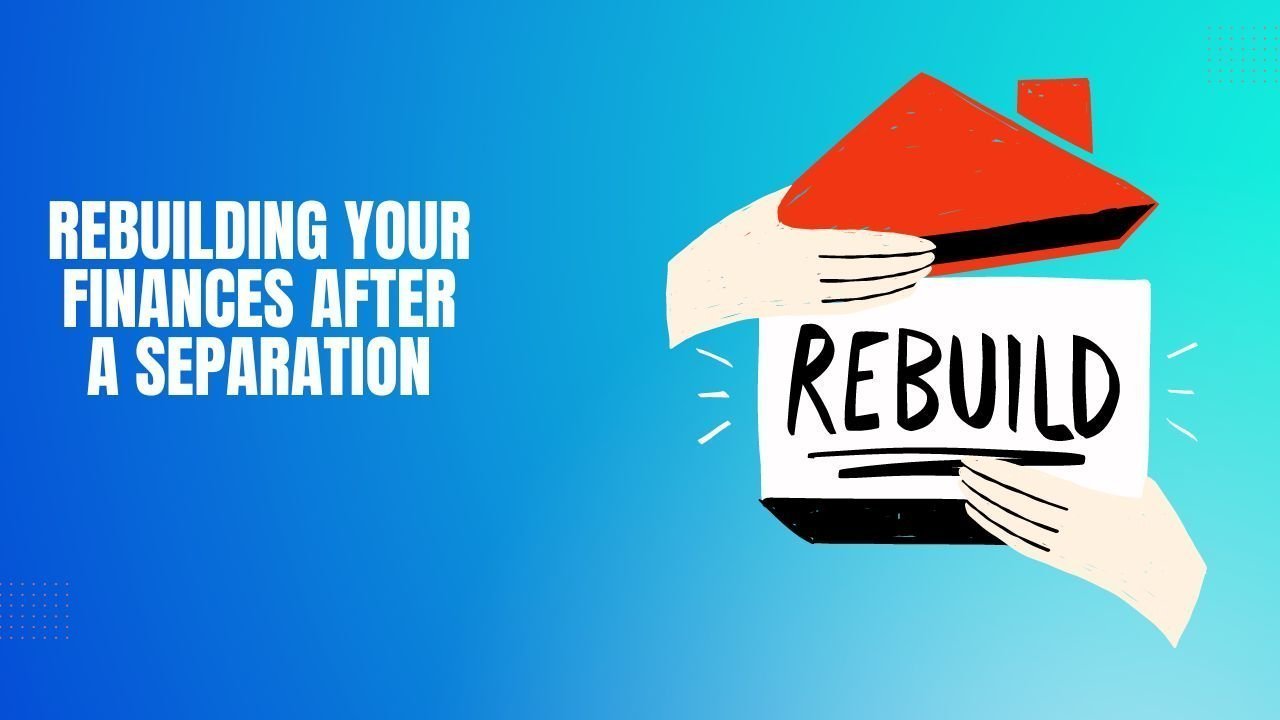Today, we’re going to talk about something that affects a lot of people: finances after separation.
According to recent research, more than 40% of marriages in the US end in divorce, and the financial impact of separation can be significant.
Whether you’re going through a divorce or a breakup, separating your finances from your former partner’s can be a challenging task.
It’s easy to feel overwhelmed and uncertain about your financial future, but it’s important to take action and start rebuilding your finances as soon as possible.
In this article, we’ll provide you with some tips and strategies to help you rebuild your finances after separation.
We’ll cover topics such as taking stock of your finances, creating a plan to pay off debt, rebuilding your emergency fund, and increasing your income.
We’ll also discuss the importance of a support system and how to surround yourself with people who can help you through this difficult time.
So, if you’re ready to take control of your finances and start rebuilding your life after separation, keep reading!
1. Take stock of your finances

When going through a separation, it’s essential to take stock of your finances before making any financial decisions.
Taking a look at your financial situation can help you determine what you need to do to rebuild your finances.
Here are some steps you can take to take stock of your finances:
1.1 Gather all financial information
The first step in taking stock of your finances is to gather all your financial information.
This includes your bank statements, credit card statements, investment accounts, and any other financial documents.
Having all your financial information in one place will help you get a clear picture of your current financial situation.
To make this process easier, consider creating a spreadsheet or using a personal finance app to track your finances.
These tools can help you keep track of your income, expenses, and debt, making it easier to manage your finances during a separation.
1.2 Assess your debt-to-income ratio
After gathering all your financial information, it’s time to assess your debt-to-income ratio.
This is the ratio of your debt payments to your income.
A high debt-to-income ratio can make it difficult to rebuild your finances after separation.
To calculate your debt-to-income ratio, add up all your monthly debt payments, including credit card payments, car payments, student loan payments, and any other debts.
Then, divide that number by your monthly income. Multiply the result by 100 to get a percentage.
Ideally, your debt-to-income ratio should be below 36%.
If it’s higher than that, you may need to take steps to pay off your debts or increase your income to improve your ratio.
1.3 Create a budget
Finally, after gathering all your financial information and assessing your debt-to-income ratio, it’s time to create a budget.
A budget is a plan for your income and expenses, and it can help you manage your finances during a separation.
To create a budget, start by listing all your sources of income, including your salary, any side hustles, or any child support or alimony payments.
Then, list all your expenses, including your housing costs, food, utilities, transportation, and any other bills or expenses.
Once you have a list of all your income and expenses, subtract your expenses from your income to determine your disposable income.
This is the money you have left over each month to save or pay down debt.
To make it easier to stick to your budget, consider using a budgeting app or tool that can help you track your spending and alert you when you’re close to going over your budget.
Here is a sample Monthly Budget:
| Category | Amount |
| Housing | $1,200 |
| Utilities | $150 |
| Food | $300 |
| Transportation | $100 |
| Insurance | $200 |
| Debt payments | $500 |
| Entertainment | $100 |
| Savings | $200 |
| Total Expenses | $2,850 |
| Total Income | $3,500 |
| Disposable Income | $650 |
2. Make a plan to pay off debt

One of the most important steps in rebuilding your finances after a separation is to make a plan to pay off debt.
High levels of debt can be a major obstacle to achieving financial stability, and paying off debt can help you free up more money to save and invest for the future.
Here are some steps you can take to make a plan to pay off debt:
2.1 Prioritize high-interest debt
The first step in paying off debt is to prioritize high-interest debt.
This includes credit card debt, personal loans, and any other debts with high-interest rates.
High-interest debt can quickly snowball and become unmanageable, so it’s essential to tackle it first.
To prioritize your high-interest debt, start by listing all your debts and their interest rates.
Then, focus on paying off the debt with the highest interest rate first, while making minimum payments on your other debts.
Once you’ve paid off the first debt, move on to the next one, and so on until you’ve paid off all your high-interest debt.
2.2 Consider debt consolidation
Another option to pay off debt is to consider debt consolidation.
Debt consolidation involves taking out a loan to pay off all your other debts, leaving you with only one monthly payment to manage.
Debt consolidation can help simplify your finances and potentially lower your interest rates, making it easier to pay off your debt.
However, it’s essential to do your research and compare interest rates and fees before choosing a debt consolidation loan.
Some loans may have high fees or require collateral, which could end up costing you more in the long run.
2.3 Negotiate payment plans
If you’re struggling to make your debt payments, it may be worth contacting your lenders or creditors to negotiate payment plans.
Many lenders are willing to work with borrowers who are experiencing financial hardship and may offer alternative payment arrangements or debt forgiveness programs.
Negotiating payment plans can help you avoid defaulting on your debts and potentially damaging your credit score.
It’s essential, to be honest with your lenders about your financial situation and to keep your communication lines open to avoid any misunderstandings.
Here’s a Sample Debt Payment Plan
| Debt | Minimum Payment | Interest Rate | Total Balance |
| Credit Card 1 | $50 | 20% | $5,000 |
| Credit Card 2 | $40 | 18% | $3,000 |
| Personal Loan | $150 | 12% | $10,000 |
| Car Loan | $200 | 6% | $15,000 |
| Total Minimum Debt | $440 | $33,000 |
Assuming a total monthly income of $4,000, the disposable income available for debt repayment is $560.
To accelerate debt repayment, consider allocating an additional $200 from the entertainment and/or savings category for a total debt repayment of $760 per month.
3. Rebuild your emergency fund

An emergency fund is an essential part of any financial plan, but it’s especially important when rebuilding your finances after separation.
An emergency fund can help you weather unexpected expenses, such as medical bills or car repairs, without having to rely on credit cards or loans.
Here’s what you need to know about rebuilding your emergency fund:
3.1 Importance of an emergency fund
According to a recent survey, more than half of millennials have less than $5,000 in savings, and only one-third have an emergency fund.
This lack of savings can leave many millennials vulnerable to financial emergencies, which can quickly spiral into debt.
Having an emergency fund can provide peace of mind and financial security, especially during uncertain times.
It can help you avoid taking on high-interest debt or dipping into retirement savings to cover unexpected expenses.
3.2 Determine how much you need
The amount you need in your emergency fund depends on your circumstances.
A good rule of thumb is to have three to six months’ worth of living expenses saved in your emergency fund.
This includes your rent or mortgage, utilities, groceries, transportation, and any other essential expenses.
To determine how much you need in your emergency fund, start by tracking your monthly expenses for a few months.
Then, multiply your average monthly expenses by three or six, depending on your risk tolerance and job stability.
For example, if your monthly expenses are $3,000, aim to save $9,000 to $18,000 in your emergency fund.
3.3 Tips for building your fund
Building an emergency fund takes time and discipline, but it’s worth the effort.
Here are some tips for building your emergency fund:
- Start small: Begin by setting a savings goal of $1,000 or $2,000. This can help you build momentum and get into the habit of saving regularly.
- Cut expenses: Look for ways to cut back on non-essential expenses, such as dining out or subscription services. Redirect that money into your emergency fund.
- Automate savings: Set up automatic transfers from your checking account into your emergency fund each month. This can help you save consistently without having to think about it.
- Use windfalls: If you receive a bonus or tax refund, consider putting some or all of it into your emergency fund.
- Consider a high-yield savings account: A high-yield savings account can earn you more interest on your emergency fund than a traditional savings account. Look for an account with a competitive interest rate and no monthly fees.
Here’s a Sample Emergency Fund Savings Plan
| Monthly Income | Emergency Fund Savings Goal (3-6 months’ worth of expenses) |
| $2,500 | $7,500 – $15,000 |
| $3,500 | $10,500 – $21,000 |
| $4,500 | $13,500 – $27,000 |
| $5,500 | $16,500 – $33,000 |
Assuming a monthly income of $3,500, an emergency fund savings goal of $15,000, and a savings timeline of 24 months, you would need to save $625 per month to reach your goal.
To reach your goal faster, consider increasing your savings rate or looking for ways to reduce your expenses.
4. Re-evaluate your retirement plan

After a separation, it’s important to re-evaluate your retirement plan to ensure you are on track to meet your goals.
Retirement planning involves determining your retirement income goals, estimating your retirement expenses, and identifying the best strategies for saving and investing your money.
According to a survey by Bankrate, 20% of millennials say they have no retirement savings at all, and 44% have less than $100,000 saved.
This is a concerning trend, as millennials will need to save more than any previous generation to support themselves in retirement.
4.1 Review and adjust your retirement plan
The first step in re-evaluating your retirement plan is to review your current plan and determine if it still meets your needs.
Consider your current retirement savings, investment performance, and retirement income goals.
You may need to adjust your retirement plan to account for changes in your income or expenses.
If you have a 401(k) or another employer-sponsored retirement plan, review your investment options and make any necessary changes.
If you have an individual retirement account (IRA), review your investment strategy and consider diversifying your investments to minimize risk.
4.2 Consider increasing your contributions
One way to boost your retirement savings after a separation is to increase your contributions.
Even a small increase in your contributions can have a significant impact on your retirement savings over time.
Consider increasing your contributions by 1% or 2% of your salary each year until you reach your desired savings goal.
According to Fidelity Investments, millennials should aim to save at least 15% of their income for retirement.
This may seem daunting, but it’s important to start saving as early as possible to take advantage of compound interest and maximize your savings potential.
In conclusion, re-evaluating your retirement plan after a separation is crucial to ensure you are on track to meet your retirement income goals.
Take the time to review your current plan, adjust as necessary, and consider increasing your contributions to boost your savings potential.
5. Rebuild Your Credit Score

After a separation, it’s essential to rebuild your credit score.
Your credit score affects your ability to obtain credit, loans, and even employment opportunities.
A good credit score can also help you get better interest rates and terms on credit products, saving you money in the long run.
Here are some steps to rebuild your credit score:
5.1 Importance of a good credit score
A good credit score is crucial to maintaining financial stability.
It’s a numerical representation of how reliable you are with credit, and lenders use it to determine the risk of lending you money.
A low credit score can make it difficult to get approved for loans, credit cards, and other financial products.
Check your credit report for errors Checking your credit report is the first step in rebuilding your credit score.
You’re entitled to a free credit report every 12 months from each of the three credit bureaus.
Review your credit report carefully to ensure there are no errors, such as incorrect personal information, accounts that don’t belong to you, or late payments that you have made on time.
Dispute any errors you find with the credit bureaus to have them corrected.
5.2 Tips for improving your credit score
There are several things you can do to improve your credit score, such as:
- Pay your bills on time: Late payments can have a significant impact on your credit score. Set up automatic payments or reminders to ensure you pay your bills on time.
- Keep your credit card balances low: High credit card balances can lower your credit score. Keep your balances below 30% of your credit limit.
- Don’t open too many new credit accounts: Opening several new credit accounts in a short amount of time can negatively impact your credit score. Only open new accounts when necessary.
- Maintain a good credit mix: Having a mix of credit accounts, such as credit cards, loans, and a mortgage, can help improve your credit score.
Rebuilding your credit score takes time and effort, but it’s worth it.
A good credit score can help you achieve your financial goals and improve your overall financial health.
6. Increase your income

6.1 Evaluate your job situation
After a separation, it’s important to re-evaluate your job situation and determine if it’s still meeting your financial needs.
Are you earning enough to cover your expenses and contribute towards your financial goals?
If not, it may be time to consider a new job or career path. Look for opportunities to advance in your current field or consider switching to a higher-paying industry.
6.2 Consider a side hustle
If you’re not in a position to change jobs or industries, consider starting a side hustle to bring in extra income.
The gig economy has made it easier than ever to earn money on the side, whether it’s through freelancing, pet-sitting, or selling goods online.
Find a side hustle that fits your skills and interests and can help you reach your financial goals faster.
6.3 Negotiate a raise
If you’re happy with your job and career path but need to earn more, it may be time to negotiate a raise.
Research the industry standards for your position and prepare a case for why you deserve a raise.
Highlight your accomplishments and contributions to the company, and be prepared to negotiate the terms of the raise.
Remember, increasing your income can be a key part of rebuilding your finances after separation.
Don’t be afraid to explore new opportunities or advocate for yourself in the workplace.
7. Surround yourself with a support system

Separation or divorce can be emotionally taxing, and it’s important to have a strong support system to help you get through it.
This support system can also help you rebuild your finances after separation.
Here are a few things to keep in mind:
7.1 Importance of emotional support
Having a strong support system can help you deal with the emotional and mental stress of separation.
Surround yourself with people who understand what you’re going through and can offer a listening ear and words of encouragement.
7.2 Consider joining a support group
Joining a support group can be a great way to connect with people who are going through a similar experience.
You can share your struggles and triumphs and get advice on how to rebuild your finances after separation.
There are many support groups available both online and in person.
7.3 Lean on friends and family
Don’t be afraid to lean on your friends and family during this time.
They can be a great source of emotional support and may even be able to help you out financially if you’re struggling to make ends meet.
However, be sure to only accept financial help if you need it and can pay them back on time.
Bottom Line…
Going through a separation is tough, but with the right mindset and financial strategy, you can come out stronger on the other side.
Remember, taking stock of your finances, making a plan to pay off debt, rebuilding your emergency fund, re-evaluating your retirement plan, rebuilding your credit score, increasing your income, and surrounding yourself with a support system are all crucial steps toward regaining financial stability.
It’s important to note that rebuilding your finances after a separation is not a quick fix.
It takes time, dedication, and patience. But with determination and the right tools, you can rebuild your financial foundation and create a brighter financial future for yourself.
Thank you for taking the time to read this post, and we wish you all the best on your financial journey.
